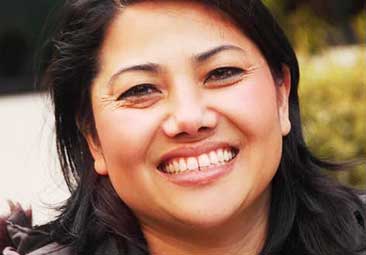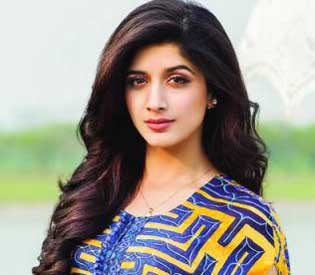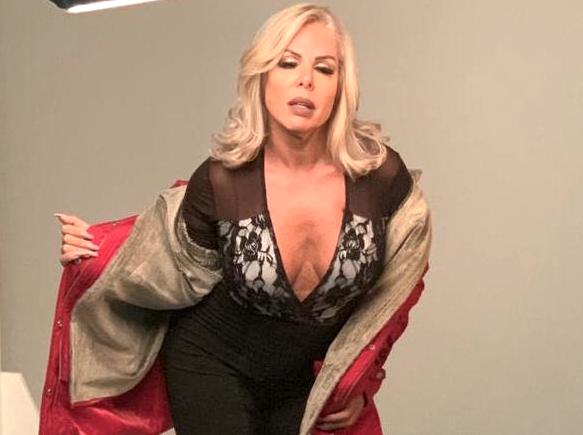Ram Kumari Jhakri (aka Ramkumari Jhakri or रामकुमारी झाँक्री in Nepali) is a Nepali women activist and politician. In 2018, Jhakri was elected into Nepal’s federal parliament through the proportional voting system. She was also a central committee member of the Communist Party of Nepal (UML). In 2021, Jhakri actively participated in forming a new political party, CPN (Unified Socialist), under the leadership of Madhav Kumar Nepal, a former Nepali Prime Minister and a senior leader of the CPN (UML) party. In the same year, Jhakri became a Secretary of the party and was appointed Minister of Urban Planning under Sher Bahadur Deuba’s government.
Jhakri was an active pro-republic political activist and a prominent face of dissent during the direct rule of King Gyanendra in Nepal in the post-2002 era. Similarly, Ram Kumari Jhakri was also a fierce critic of Nepali Prime Minister KP Oli and his government. She also severely criticised President Bidhya Devi Bhandari during Bhandari’s second tenure as Nepal’s head of state. Jhakri has been a long-time advocate for women’s rights, and indigenous and student rights in Nepal.
In 2008, Jhakri was elected as the President of the All Nepal National Free Students Union (ANNFSU) at the organisation’s 19th National Convention in Pokhara. Jhakri was the first female to be elected in that post. She, in fact, was the first woman president of any student organization in Nepal.
Early Life & Education
Ram Kumari Jhakri was born on 23 May 1970 in the Myalpokhari village of Gulmi, Nepal. Her family was a typical Nepali lower-middle-class family and belonged to an ethnic minority group. Even though her immediate family members were not very active politically, Jhakri says in media interviews that they were politically conscious and were aware of the discrimination between the haves and have-nots in their surroundings.
Jhakri spent her childhood in Myalpokhari and attended a local public school. She says that as a kid, she was good at studies and always came first in class until grade 10. She also regularly took part in quiz contests, speech contests and other extra-curricular activities at school.
Jhakri has a Master’s Degree in Political Sciences from Tribhuvan University, Kathmandu, Nepal.
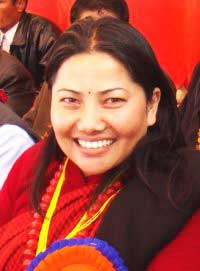 | |||||
| NATIVE NAME: | रामकुमारी झाँक्री | ||||
| BIRTHDAY: | 23 May 1979 | ||||
| BIRTHPLACE: | Myalpokhari, Gulmi | ||||
| EDUCATION: | Master’s Degree (MA) | ||||
| PROFESSION: | Politician, Activist | ||||
| HUSBAND: | Pashupati Puri | ||||
| NATIONALITY: | Nepali | ||||
| ETHNICITY: | Asian | ||||
| RELIGION: | Hindu | ||||
| FAMILY: | HUSBAND: Pashupati Puri
SON: Aarav Puri | ||||
| CHILDREN: | 1 son | ||||
| FOLLOW ON: |
| ||||
(Ram Kumari Jhakri talking to Nepali journalist Rishi Dhamala after she resigned as a minister on 26 June 2022) | |||||
Jhakri’s Political Career
Jhakri has said that she was attracted to communist political ideology and Marxism from an early age. When she was studying in grade six, one of her teachers, reportedly, gave a lengthy lecture on Marxist political ideology and she instantly admired it.
Jhakri was soon an active cadre of the student organisation of the CPN (UML) party. Her brother also helped her make district-level political connections in Gulmi. She completed the School Leaving Certificate (SLC) from a public school in Gulmi and moved to Kathmandu with an ambition to pursue higher education.
When Jhakri moved to Kathmandu, it was politically a stimulating environment. Democracy had been just reinstated in Nepal. However, people’s aspirations had remained unfulfilled and some of the deepest structural issues of Nepali society were still unaddressed. A young Jhakri concluded with a Marxist analysis that even though a political change had taken place, a vicious class struggle continued to exist in Nepal.
While a student at a public college in Kathmandu, Jhakri began to get involved in political activism. She played a vital role in securing a 50% discount for students on public transportation. She also led demonstrations against Indian border encroachment in the Terai and actively campaigned against price hikes of petroleum products in Nepal.
In 2008, the ANNFSU, the student wing of the Communist Party of Nepal (UML), chose Jhakri as its national President at its 19th National Congress held in Kaski, Pokhara. She made history by becoming the first female to be elected for the post.
Jhakri was later elected as a central committee member of the CPN (UML) party and was in charge of overseeing party activities in Europe (amongst the Nepali diaspora).
Jhakri was appointed Nepal’s Minister of Urban Planning on 23 September 2021. On 5 June 2022, her party announced that Mrs Jhakri and three other ministers were being recalled from the government. The decision was shortly dismissed. After a few weeks of confusion, Jhakri resigned from the post on 26 June 2022. On her last day as a minister, she organised a press conference where she briefly cried. The incident was reported widely by the Nepali media.
Contrary to people’s expectations, Jhakri’s performance as a minister was mediocre. In the upcoming 2022 Nepal parliamentary elections, Jhakri is expected to contest from her election area Gulmi-2.
Personal Life
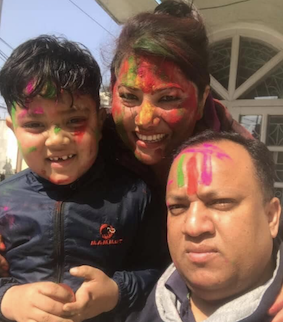
Ram Kumari Jhakri’s husband is Pashupati Puri. Puri is a government officer. The couple married in 2014 at a wedding ceremony organised in Kathmandu. Jhakri and Puri have a son, Aarav.
Controversies
In 2018, audio of a phone conversation between Jhakri and a Nepali Congress party cadre was leaked. In the audio, Jhakri is heard threatening the opposition party cadre.
In 2021, Jhakri, in a speech she delivered in Gurkha, called on Nepal’s President Bidhya Devi Bhandari to leave the presidential palace and come to active politics. Among others, she also said that the President could go to Balkot, Prime Minister KP Oli’s private residence. Jhakri’s remarks were widely criticised and Nepal Police briefly arrested her on charges of crime against the state. These charges were later dropped and Jhakri was released within hours.
Social Media Activism
Ram Kumari Jhakri is an active social media user and has used social media platforms, especially Facebook and Twitter, to raise political awareness and speak against corruption, impunity as well as political immorality in Nepal. Her views are widely reported in the Nepali mainstream media. Jhakri also maintains a TikTok account where she frequently posts videos.
Updated: 27 June 2022

